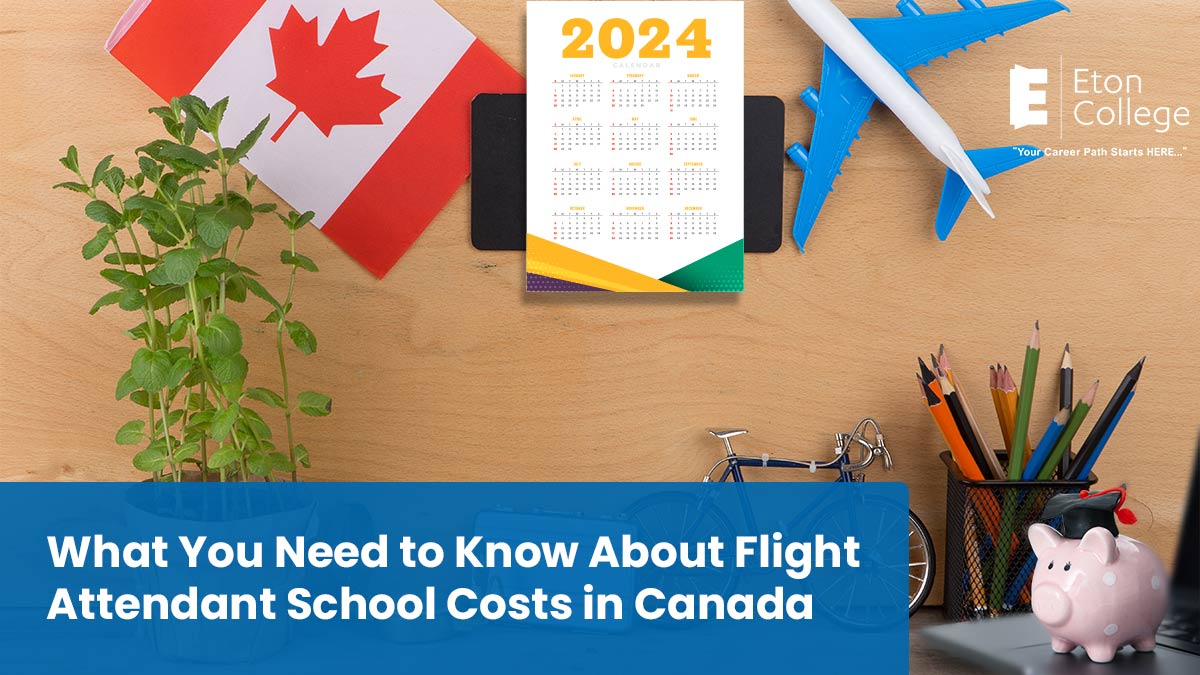- The cost of flight attendant courses in Canada ranges from CAD 2,500 to CAD 7,500, depending on program length and curriculum depth.
- This cost is influenced by factors such as program length, location, institution reputation, and the inclusion of additional certifications and materials.
- Courses vary in length, with shorter programs lasting 4-6 weeks and more comprehensive courses extending up to 12+ weeks.
- Students must also account for expenses such as uniforms, textbooks, transportation, and certification fees.
- Optional certifications like CPR and first aid can increase costs but improve employability.
Becoming a flight attendant in Canada requires not only dedication and training but also a financial investment. The cost of flight attendant course programs can vary widely depending on the institution, program length, and additional expenses such as uniforms, materials, and certifications.
In this blog, we will explore the typical costs associated with flight attendant course programs in Canada, factors that influence these costs, and what you can expect from your investment in pursuing a career in aviation.
The Average Cost of Flight Attendant School in Canada
The cost of flight attendant course programs in Canada typically ranges from CAD 2,500 to CAD 7,500. However, some more comprehensive programs, such as those offered by accredited institutions like Eton College, may cost more depending on the curriculum and duration of the course.
Here’s a breakdown of typical tuition fees based on the length and scope of the program:
- Shorter Programs (4 to 6 weeks): These programs, which focus on the essentials of flight attendant course training, generally cost between CAD 2,500 and CAD 4,000. They are ideal for individuals who want to complete their training quickly and begin working. While they provide the necessary qualifications, shorter programs may lack the depth of more extended courses.
- Standard Programs (8 to 12 weeks): These programs are more comprehensive and typically range from CAD 4,000 to CAD 7,500. They offer in-depth training on safety protocols, customer service, and emergency procedures, and often include more practical simulations. These programs may also provide additional certifications, which can enhance employability.
- Specialized Programs (12+ weeks): Some specialized programs, such as those offered in combination with other certifications (e.g., hospitality management), can cost more than CAD 7,500. These programs often include advanced first aid certifications, language proficiency training, and extensive hands-on experience through mock flights and safety drills.
For example, Eton College’s Hospitality Management and Flight Attendant Preparation Program offers a 44-week diploma program with tuition fees of CAD 13,000 for domestic students.
Factors That Affect the Cost of Flight Attendant Training
Several factors influence the overall cost of flight attendant school in Canada, including the program’s length, reputation, and location.
Let us take a closer look at these factors:
1. Institution and Location
The school’s location can significantly impact the tuition fees. Flight attendant course programs in larger cities like Toronto, Vancouver, or Montreal often have higher tuition costs due to the overall cost of living in these regions.
On the other hand, schools in smaller towns may offer more affordable training programs. Additionally, well-known institutions or those affiliated with major airlines may charge higher tuition fees due to their strong industry connections and reputation.
2. Program Length and Curriculum
The duration and depth of the flight attendant course will directly affect the tuition cost. Shorter programs focus on essential skills and are generally less expensive, while longer programs that cover more advanced topics, including customer service, safety protocols, and emergency training, will cost more. Programs that include extensive practical exercises, such as mock flights and safety drills, also tend to be more expensive because they require specialized facilities and equipment.
3. Additional Certifications
Flight attendant course programs often offer optional certifications that can add value to your credentials but also increase the overall cost. For example, obtaining certifications in CPR, first aid, or language proficiency can boost your employability, especially for international airlines, but these certifications may come with additional fees.
4. Included Materials
Some flight attendant schools include the cost of textbooks, uniforms, and other materials in the tuition fee, while others require students to purchase these items separately. For example, at Eton College, the total fee for the Hospitality Management and Flight Attendant Preparation Diploma includes ancillary fees, which cover additional materials required during the training.
Additional Costs to Consider
In addition to tuition fees, there are several other expenses associated with flight attendant training. These costs can vary depending on the program and the institution, but it’s essential to account for them when planning your budget.
1. Uniforms
Most flight attendant schools require students to wear uniforms during their training. The cost of uniforms can range from CAD 100 to CAD 500, depending on the school’s requirements. Some programs may include the cost of uniforms in the overall tuition fee, while others may charge separately.
2. Textbooks and Training Materials
Textbooks, training manuals, and other materials are necessary for completing the flight attendant program. These can cost between CAD 200 and CAD 500, depending on the course. While some schools include these materials in the tuition, others may require students to purchase them independently.
3. Transportation and Accommodation
If you’re attending a flight attendant school in a different city, you’ll need to account for the cost of transportation and accommodation. The cost will vary based on the city’s cost of living and your personal preferences for housing. For students attending flight attendant course programs in major cities like Vancouver or Toronto, accommodation and transportation can significantly impact the overall cost of their training.
4. Certification and Licensing Fees
Some flight attendant course programs require students to pay for additional certifications, such as aviation safety or first aid certification. These fees can range from CAD 100 to CAD 300, depending on the certification. If your program includes these certifications, make sure to confirm whether they are included in the tuition or if you’ll need to pay extra.
Is the Investment Worth It?
The cost of flight attendant school in Canada can be a significant investment, but for those passionate about aviation and customer service, it’s an investment that can lead to a fulfilling and rewarding career. Flight attendants in Canada earn an average starting salary of CAD 35,000 to CAD 50,000 per year, with opportunities for salary increases and career advancement over time. Additionally, flight attendants enjoy perks such as free or discounted travel, health benefits, and flexible work schedules, making it a highly desirable career for those who love to travel.
Charting Your Path to a Career in Aviation
The cost of flight attendant school in Canada varies, with tuition fees typically ranging from CAD 2,500 to CAD 7,500, depending on the program and institution. While the financial commitment may seem significant, the rewards of a career in aviation make it worthwhile for those passionate about travel and customer service.
Eton College offers a comprehensive Hospitality Management and Flight Attendant Preparation Program, providing you with the skills, certifications, and experience needed to pursue a career as a flight attendant. With the right training, you’ll be well-prepared to succeed in this exciting industry.




